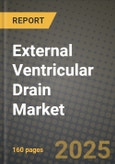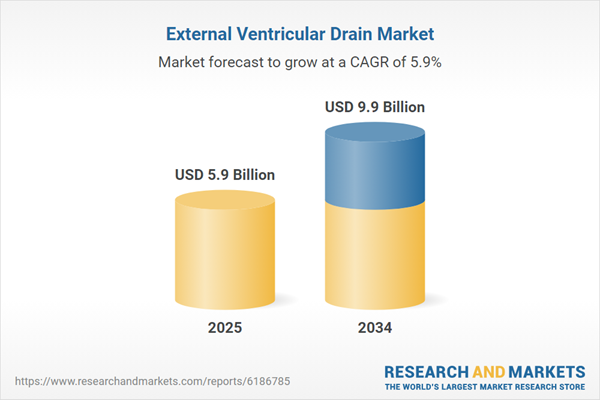External Ventricular Drain Market Overview
The external ventricular drain (EVD) market is witnessing steady growth due to the increasing prevalence of neurological disorders, traumatic brain injuries (TBIs), and hydrocephalus. EVD systems play a crucial role in managing elevated intracranial pressure (ICP) by draining excess cerebrospinal fluid (CSF) and providing real-time pressure monitoring. The rising incidence of strokes and brain tumors has further driven demand for EVD procedures in neurosurgical interventions. Technological advancements in catheter materials, infection-resistant coatings, and digital monitoring systems are enhancing the safety and efficacy of EVD devices. Additionally, the growing awareness of neurological critical care and improved access to advanced healthcare infrastructure in developing regions are contributing to market expansion. However, challenges such as infection risks, catheter blockage, and procedural complications remain key concerns that manufacturers and healthcare providers aim to address. As research continues to refine EVD technology, the market is expected to grow with innovations in precision drainage systems and infection control strategies.the external ventricular drain market has seen significant advancements in infection prevention and real-time monitoring capabilities. The introduction of antimicrobial-impregnated catheters and biocompatible materials has helped reduce the incidence of ventriculitis and catheter-associated infections, improving patient outcomes. Additionally, the integration of digital ICP monitoring systems has enhanced real-time data collection, allowing neurosurgeons to make precise clinical decisions. The demand for minimally invasive neurosurgical procedures has also influenced product development, with companies investing in next-generation EVD systems that offer better accuracy and reduced complications. Regulatory agencies have updated safety guidelines for EVD procedures, emphasizing standardized protocols to minimize infection risks. Furthermore, hospitals and neurosurgical centers have adopted advanced training programs for healthcare professionals, ensuring the safe and efficient use of EVD devices. Strategic collaborations between medical device manufacturers and research institutions are accelerating the development of novel drainage solutions, further driving market growth.
The external ventricular drain market is expected to undergo transformative changes with the adoption of AI-driven monitoring and predictive analytics. Smart EVD systems with automated pressure regulation and real-time connectivity to hospital networks will enhance patient management and reduce complications. Innovations in bioengineered catheter coatings will further minimize infection risks, increasing the reliability and longevity of EVD devices. The market is also expected to expand in emerging economies as healthcare infrastructure and neurosurgical expertise improve, leading to increased access to critical care interventions. Additionally, the integration of robotic-assisted neurosurgery in EVD placement will enhance precision, reducing procedural risks and improving patient recovery rates. With regulatory bodies focusing on safety enhancements, future EVD systems will incorporate improved fail-safe mechanisms and smart alerts for real-time complications. As research continues to explore the intersection of EVD technology and neurocritical care, the market is set to grow with enhanced patient-centered solutions and cutting-edge innovations.
Key Insights: External Ventricular Drain Market
- Advancements in Antimicrobial Coatings: The development of antimicrobial-impregnated catheters is reducing the risk of catheter-associated infections, improving patient safety, and increasing the longevity of EVD systems.
- Integration of AI in ICP Monitoring: Artificial intelligence and machine learning are being incorporated into EVD monitoring systems to provide real-time analytics, early complication detection, and predictive insights for neurosurgeons.
- Expansion of Minimally Invasive Neurosurgical Techniques: The shift towards minimally invasive procedures has led to the development of more precise and efficient EVD placement techniques, reducing patient trauma and hospital stays.
- Growth of Smart EVD Systems: Next-generation EVD devices with automated pressure control and digital connectivity are enhancing critical care management and reducing manual intervention risks.
- Rising Adoption of Robotic-Assisted EVD Placement: The integration of robotics in neurosurgery is improving the accuracy of EVD catheter placement, minimizing procedural errors, and optimizing patient outcomes.
- Increasing Cases of Traumatic Brain Injuries (TBIs) and Strokes: The rising global incidence of TBIs and strokes is driving demand for external ventricular drains in neurocritical care settings.
- Advancements in Neurocritical Care Infrastructure: Improved healthcare infrastructure and specialized neuro ICU facilities are expanding access to EVD procedures, particularly in emerging markets.
- Regulatory Support for Patient Safety and Infection Control: Stringent regulatory guidelines for infection prevention and device safety are promoting the adoption of high-quality, standardized EVD systems.
- Rising Investments in Neurosurgical Innovations: Increased funding for neurosurgery research and collaborations between medical device manufacturers and healthcare institutions are accelerating product development and market expansion.
- Risk of Infection and Catheter Blockage: Despite advancements in antimicrobial coatings, catheter-associated infections and blockages remain a major challenge, requiring continuous innovation in materials and drainage technology.
External Ventricular Drain Market Segmentation
By Product
- External Ventricular Drainage Set
- Accessories
By Application
- Traumatic Brain Injury
- Intracranial Hemorrhage
- Hydrocephalus
- Other Applications
By End-User
- Hospitals
- Specialty Hospitals
- Specialty Clinics
- Other End-Users
Key Companies Analysed
- Medtronic Plc
- B. Braun SE
- Terumo Corporation
- Getinge AB
- Elekta AB
- Integra LifeSciences
- ABIOMED
- Raumedic AG
- Natus Medical Inc.
- Sophysa
- Fuji Systems
- Neuromedex GmbH
- Ark BioSciences Inc.
- SILMAG S.A.
- Spiegelberg GmbH & Co. KG
- Möller Medical GmbH
- Dispomedica GmbH
- IRRAS AB
- Luciole Medical AG
- Dispomedica GmbH
External Ventricular Drain Market Analytics
The report employs rigorous tools, including Porter’s Five Forces, value chain mapping, and scenario-based modeling, to assess supply-demand dynamics. Cross-sector influences from parent, derived, and substitute markets are evaluated to identify risks and opportunities. Trade and pricing analytics provide an up-to-date view of international flows, including leading exporters, importers, and regional price trends.Macroeconomic indicators, policy frameworks such as carbon pricing and energy security strategies, and evolving consumer behavior are considered in forecasting scenarios. Recent deal flows, partnerships, and technology innovations are incorporated to assess their impact on future market performance.
External Ventricular Drain Market Competitive Intelligence
The competitive landscape is mapped through proprietary frameworks, profiling leading companies with details on business models, product portfolios, financial performance, and strategic initiatives. Key developments such as mergers & acquisitions, technology collaborations, investment inflows, and regional expansions are analyzed for their competitive impact. The report also identifies emerging players and innovative startups contributing to market disruption.Regional insights highlight the most promising investment destinations, regulatory landscapes, and evolving partnerships across energy and industrial corridors.
Countries Covered
- North America - External Ventricular Drain market data and outlook to 2034
- United States
- Canada
- Mexico
- Europe - External Ventricular Drain market data and outlook to 2034
- Germany
- United Kingdom
- France
- Italy
- Spain
- BeNeLux
- Russia
- Sweden
- Asia-Pacific - External Ventricular Drain market data and outlook to 2034
- China
- Japan
- India
- South Korea
- Australia
- Indonesia
- Malaysia
- Vietnam
- Middle East and Africa - External Ventricular Drain market data and outlook to 2034
- Saudi Arabia
- South Africa
- Iran
- UAE
- Egypt
- South and Central America - External Ventricular Drain market data and outlook to 2034
- Brazil
- Argentina
- Chile
- Peru
Research Methodology
This study combines primary inputs from industry experts across the External Ventricular Drain value chain with secondary data from associations, government publications, trade databases, and company disclosures. Proprietary modeling techniques, including data triangulation, statistical correlation, and scenario planning, are applied to deliver reliable market sizing and forecasting.Key Questions Addressed
- What is the current and forecast market size of the External Ventricular Drain industry at global, regional, and country levels?
- Which types, applications, and technologies present the highest growth potential?
- How are supply chains adapting to geopolitical and economic shocks?
- What role do policy frameworks, trade flows, and sustainability targets play in shaping demand?
- Who are the leading players, and how are their strategies evolving in the face of global uncertainty?
- Which regional “hotspots” and customer segments will outpace the market, and what go-to-market and partnership models best support entry and expansion?
- Where are the most investable opportunities - across technology roadmaps, sustainability-linked innovation, and M&A - and what is the best segment to invest over the next 3-5 years?
Your Key Takeaways from the External Ventricular Drain Market Report
- Global External Ventricular Drain market size and growth projections (CAGR), 2024-2034
- Impact of Russia-Ukraine, Israel-Palestine, and Hamas conflicts on External Ventricular Drain trade, costs, and supply chains
- External Ventricular Drain market size, share, and outlook across 5 regions and 27 countries, 2023-2034
- External Ventricular Drain market size, CAGR, and market share of key products, applications, and end-user verticals, 2023-2034
- Short- and long-term External Ventricular Drain market trends, drivers, restraints, and opportunities
- Porter’s Five Forces analysis, technological developments, and External Ventricular Drain supply chain analysis
- External Ventricular Drain trade analysis, External Ventricular Drain market price analysis, and External Ventricular Drain supply/demand dynamics
- Profiles of 5 leading companies - overview, key strategies, financials, and products
- Latest External Ventricular Drain market news and developments
Additional Support
With the purchase of this report, you will receive:- An updated PDF report and an MS Excel data workbook containing all market tables and figures for easy analysis.
- 7-day post-sale analyst support for clarifications and in-scope supplementary data, ensuring the deliverable aligns precisely with your requirements.
- Complimentary report update to incorporate the latest available data and the impact of recent market developments.
This product will be delivered within 1-3 business days.
Table of Contents
Companies Mentioned
- Medtronic PLC
- B. Braun SE
- Terumo Corporation
- Getinge AB
- Elekta AB
- Integra LifeSciences
- ABIOMED
- Raumedic AG
- Natus Medical Inc.
- Sophysa
- Fuji Systems
- Neuromedex GmbH
- Ark BioSciences Inc.
- SILMAG S.A.
- Spiegelberg GmbH & Co. KG
- Möller Medical GmbH
- Dispomedica GmbH
- IRRAS AB
- Luciole Medical AG
- Dispomedica GmbH
Table Information
| Report Attribute | Details |
|---|---|
| No. of Pages | 160 |
| Published | October 2025 |
| Forecast Period | 2025 - 2034 |
| Estimated Market Value ( USD | $ 5.9 Billion |
| Forecasted Market Value ( USD | $ 9.9 Billion |
| Compound Annual Growth Rate | 5.8% |
| Regions Covered | Global |
| No. of Companies Mentioned | 20 |









